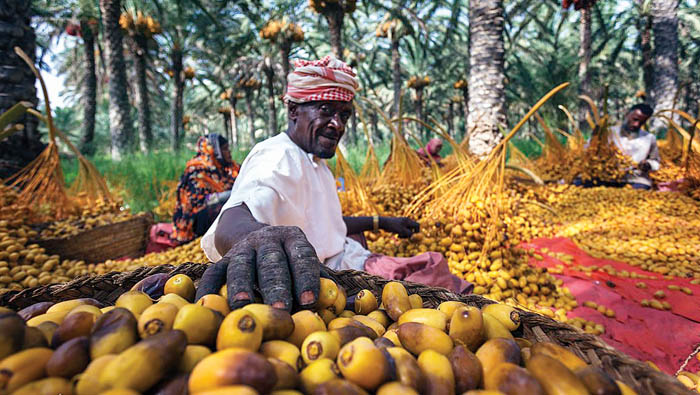
Muscat: The harvest season for dates, during which farmers start the process of collecting date crops, has begun in the Sultanate.
The traditional date harvest season, called ‘Jidad’ or ‘Al Tabseel’, is still followed across the Sultanate. It starts in June and continues until September, depending on the type of palm tree and the method of harvesting.
“Al Sharqiyah is the first governorate in Oman to start the harvest season in June continuing to July,” said Abdullah Al Maqhousi, a citizen from the south Al Sharqiyah Governorate.
“That is due to the type of palm trees that grow in the governorate, which mature quickly, and the fact that the province is affected by the autumn season in May, which negatively affects the quality of the dates, if we are late in harvesting.”
Al Tabseel
The ‘Al Tabseel’ process focuses on date palms called Al Mabsily dates, which still have a yellowish colour. After the dates are picked fresh from the palm trees, they are collected at a special place for cooking called ‘Tarkibah’.
“We fire the wood in a hole made of clay, and we put the dates in huge pots called ‘Marajel’,” said Bediyah resident Yahya Al Hajri.
“These fresh dates are boiled in these pots for some half an hour,” Al Hajri. The boiled dates are then taken to an open space called ‘Al Mestah’ where they are dried under the sun for four to five days. Later, the dates are packaged in a proper manner.
“The dates produced are sold in the local markets, while the boiled dates called ‘Al Faghour’ are exported to East Asian countries such as India and others, where they are used to manufacture chocolate and other sweets,” said Al Hajri.
‘Al Jidad’ is another method of harvesting date crops in the Sultanate. This process is followed in most states across the country.
“I have three farms and for two days we harvest 200 palm trees,” said Abdullah, a farmer from Jalan Bani Bu Ali. “The ‘Abu Du’en’ reddish date is the most popular type of palm tree in our place.”
“The Al Jidad process passes through a number of stages,” he added. “First, we cut clusters of dates off the palm trees, then we separate the dates from the cluster and spread them out in an open area under the sun for two or three days. Then we filter the crops by separating the rotten dates from the edible dates.”
Al Maqhousi emphasised that the entire process was done manually. “All these stages are carried out manually and take two weeks or more, depending on the quantity of the crops and the number of workers,” he said. “After that, a huge quantity of these dates are packed in large bags called ‘Joniyah’.”
He also revealed that the Abu Du’en date was unique as it contained less sugar. “The main characteristic of the Abu Du’en date is the lower quantity of sugar and calories it contains compared to other types of dates,” Al Maqhousi explained.
“A one-tonne Joniyah bag is sold at a value ranging from OMR25 to OMR28, and some people produce molasses from the dates while they are stored.”
Date harvesting used to be one of the traditional occasions where families would gather. In the past, local farmers would invite relatives and friends to participate in the harvesting season.
This habit has largely disappeared, farmers said.
“Family gatherings used to happen in the past years, but now family gatherings during the Al Tabseel season have decreased significantly, and it is rare to see a family of co-workers harvesting the date palm,” said the 24-year-old Al Hajri.
“Palm harvesting is a very important season for us,” explained Al Maqhousi, who is now 68. “In the past, dates were our main source of food, but now, many of our young people think date harvesting is not important, tiring, and useless, so they avoid helping during the harvest season,” he said.
“People should pay attention to this habit and this natural wealth, lest we go back to the time when the date is the only source of food for us,” he added.